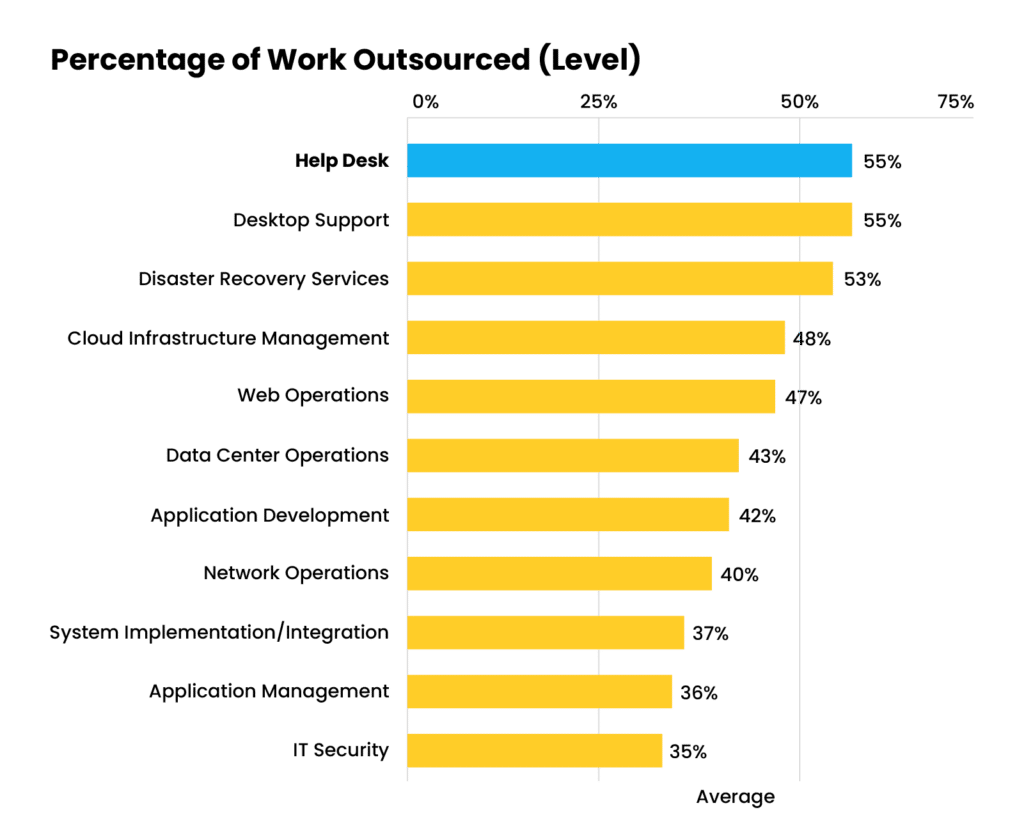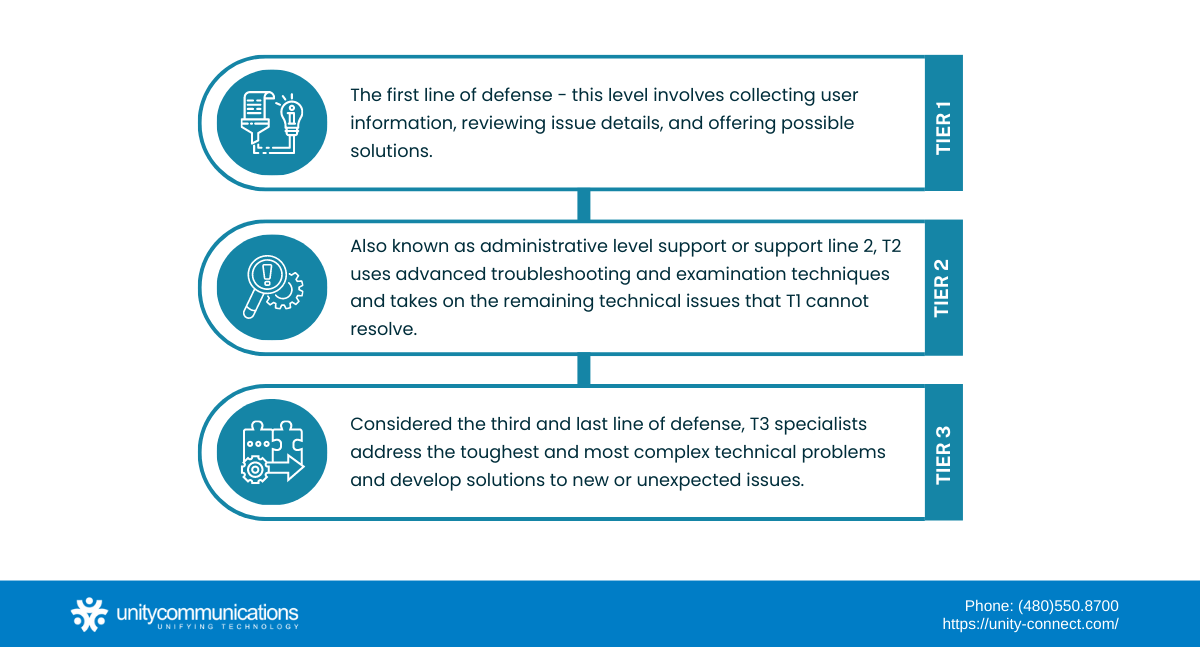What Is Outsourced Help Desk? Features & Pricing In 2025
Managing a business can be tough. With so much to do, it’s easy to lose focus on what really matters. As your business grows, so do the challenges, especially when it comes to providing top-notch customer support. Thus, handling the increasing number of inquiries and service requests can overwhelm your in-house team.
That’s why many small and medium-sized businesses are turning to outsourced help desks. It’s a smart solution to tackle the issue of promptly addressing your customers’ needs and technical issues. This article dives deep into outsourced help desk services, covering different models, benefits, and pricing tailored to various industries.
What Is Help Desk Outsourcing?
Help desk outsourcing has experienced significant growth over the past few years, more than doubling since 2021. According to the 2023 IT Outsourcing Statistics Report by Computer Economics, 50% of organizations now outsourced help desks functions either fully or partially. The report also highlights that help desk services rank among the most commonly outsourced functions, alongside desktop support and disaster recovery services.

Image source: auxis
Outsourced help desks involves subcontracting IT support responsibilities to an external service provider. This is a form of IT outsourcing, where businesses entrust specific IT functions to specialized third-party companies. An outsourced help desk serves as the initial point of contact for customers and employees, offering assistance via various channels like live chat, email, or phone calls. They essentially function as an IT service desk, armed with the knowledge and tools to tackle a whole array of technical glitches, becoming an integral part of your IT crew.
Outsourced help desks involves subcontracting IT help desk outsourcing support responsibilities to an external service provider. A help desk serves as the initial point of contact for customers and employees, offering assistance via various channels like live chat, email, or phone calls. They’re armed with the knowledge and tools to tackle a whole array of technical glitches, essentially becoming an integral part of your IT crew.
Can Outsourcing Help Your Desk?
Outsourced help desks services has become more prevalent among IT-managed service providers and private companies operating within constrained budgets. Below are several key reasons why numerous organizations opt to delegate their help desk solutions:
Cost Reduction
Outsourced help desks presents a lucrative opportunity for businesses to trim expenses significantly. By entrusting tasks to external providers, companies can curtail expenditures linked to recruitment, training, and maintaining an internal workforce. According to Deloitte’s 2020 Global Outsourcing Survey, cost reduction is a primary driver for 70% of outsourcing decisions. This is a key consideration when evaluating IT outsourcing costs.

Image source: 99firms.com
Availability of High-quality Support Services
The proficiency of your in-house team is restricted by financial constraints and training limitations. However, through outsourced help desk services, you tap into a diverse pool of specialists with extensive expertise.
Enhanced Productivity
Your in-house team is liberated from the mundane tasks of technical support. By entrusting your help desk operations to a capable provider, your employees can recapture precious time and channel their efforts towards essential business functions that drive profitability. Research has consistently demonstrated that companies utilizing external help desks witness heightened productivity within their internal teams. With this newfound concentration, your staff can channel their energies towards revenue-generating activities and fundamental services, thus fostering the expansion of your enterprise.
Quicker Response Times
Outsourced help desks can significantly boost your response time by providing 24/7 help desk support. This ensures your customers receive assistance whenever they face an issue, no matter the time zone. What’s more, many providers offer remote access features, enabling technicians to diagnose and fix problems directly on the customer’s device. This cuts down on the typical back-and-forth communication in technical support, resulting in quicker solutions.
Enhanced Customer Satisfaction
When you partner with an IT outsourcing or software development company for your help desk needs, you’re setting the stage for meeting customer expectations with every support interaction. By tapping into the specialized knowledge and established protocols of a dedicated provider, you guarantee a level of support that is reliable and of top-notch quality. This consistency fosters trust and satisfaction among your customers, as they experience timely resolutions and efficient problem-solving. Ultimately, these elements form the cornerstone of long-term customer happiness and loyalty.
What Factors Affect The Costs Of IT Help Desk Outsourcing Services?

Source: Unitycommunications
While outsourced support desk services offer various benefits, it’s crucial to grasp several elements that can influence the outsourcing expenses. Here are a few of these factors:
Geographical Position
When choosing an outsourced help desk partner, consider their location. Labor markets and operational costs vary greatly by country. For example, the US typically has higher labor costs compared to Vietnam. This difference can be attributed to factors like cost of living and local wages. Labor markets and operational costs vary greatly by country, impacting the cost of outsourced help desk services.
Proficiency Level
The expertise of your outsourced help desk partners impacts the cost. Tasks requiring more specialized skills or extensive experience will naturally cost more. Think of it like hiring a consultant – their level of knowledge directly affects their fees. So, if you need a highly specialized team or 24/7 support, expect the cost to reflect that higher level of service.
Level of Service
The price you pay for an outsourced help desk can change based on factors like 24/7 availability, multilingual help desk support, and the complexity of technical issues. If you want support 24/7 or you have customers who speak lots of different languages, it usually costs more because it’s harder for the company to manage. On the other hand, if you’re okay with just getting help during regular business hours or if your issues are pretty straightforward, it might be cheaper because it’s easier for the company to handle.
Technological Infrastructure
The complexity of your tech setup can influence the cost of outsourced help desk services. More intricate systems require a wider range of technological expertise. Just like building a house, a more intricate foundation requires more specialized work. This translates to outsourcing costs, as the team will need a wider range of technological expertise.
Linguistic Capability
When it comes to the interconnected business world, being able to communicate effectively across different languages is essential for companies looking to thrive in diverse markets. This capability enables businesses to engage with a broader spectrum of customers and tap into new opportunities for growth.
The linguistic proficiency of a company can significantly affects its operational costs, particularly in areas like help desk services. Offering support in multiple languages can impact pricing structures, with less commonly spoken languages often requiring higher investments to ensure access to qualified staff.
Contract Length
The length of your outsourcing contract can significantly impact cost and overall satisfaction. Longer contracts often come at a lower cost per unit of service. This is because extended contracts provide stability and predictability for both parties involved. The service provider has a guaranteed timeframe to understand your needs and refine their approach, ultimately enhancing the quality of service delivered.
And those are all the most common factors that affect outsourced help desk pricing. In the next section, we will delve deeper into outsourced help desk models and their prices. The prices below are estimates only and may vary depending on the country.
Get in touch with Savvycom for a free consultation. We’ll help you decide on next steps, explain how the development process is organized, and provide you with a free project estimate.
Different Models Of Outsourced Help Desk Pricing?
When seeking help desk outsourcing solutions, you may encounter various pricing structures. Evaluating the merits and demerits of each model is crucial in selecting the most suitable one for your business. Some of the prevalent models include:
Pay Per Ticket Pricing
Charges are incurred based on the number of IT support tickets resolved. This model is advantageous for businesses with fluctuating ticket volumes. This model is particularly advantageous for businesses with fluctuating ticket volumes, as it aligns costs directly with service usage. The cost per ticket for outsourced help desk support can range from $10 to $50.
|
Pros |
Cons |
|
Fair Billing: Costs are directly tied to the number of tickets, ensuring you pay only for what you use. |
Less Customization: Tailored support solutions may not be as prevalent due to the transactional nature of the model. |
|
Transparent Costs: Easy to track and manage expenses with a clear record of tickets handled. |
Unpredictable Costs: Fluctuating ticket volumes can make budgeting for support services challenging. |
The tiered pricing model is ideal for businesses that experience seasonal demand fluctuations and have a limited budget for help desk support.
Pay Per Hour Pricing
Per Hour Pricing is a simple model where the cost depends on how many hours the help desk team works, regardless of how many tickets they handle. In the USA, outsourcing usually costs between $20 and $45 per hour.
|
Pros |
Cons |
|
Flexibility: Clients can adjust project scope and duration to match changing business needs. |
Potential Cost: This model may be costlier than per-ticket pricing due to varying support hours, especially with complex issues. |
|
Detailed Billing: Companies receive itemized billing, showing hours worked and tasks completed. |
Budgeting Challenges: Actual project costs can significantly differ from initial estimates, making budgeting difficult. |
Pay Fixed Fee Pricing
A fixed monthly or annual fee covers all support services, ideal for businesses with predictable support needs. In this arrangement, you’ll be charged a flat rate for a predetermined number of support hours. The flat rate for outsourcing help desks can range from $1,000 to $10,000 per month.
|
Pros |
Cons |
|
Price Stability: Reduces the risk of sudden fee increases due to unexpected incidents. |
Limited Flexibility: Modifications to the scope of work may necessitate adjustments to the payment plan, entailing additional resources and time. |
|
Financial Planning: Enables businesses to budget effectively by knowing the exact cost upfront. Itemized billing, showing hours worked and tasks completed. |
Time-Consuming Planning: Requires thorough planning, which can be time intensive. Can significantly differ from initial estimates, making budgeting difficult. |
Pay Tiered Pricing
Pay tiered pricing offers various pricing levels based on service volume or required support, enabling businesses to adjust services as needed. This model presents multiple package tiers with differing service levels, usually categorized by quantity, features, quality, or usage factors. For instance, lower tiers may include basic support during business hours, while higher tiers offer additional services like on-site visits and 24/7 support.
|
Pros |
Cons |
|
Flexibility: Businesses can select the service level that aligns with their needs and budget. |
Complexity: Tiered pricing can be more intricate and challenging to comprehend compared to other pricing models. |
|
Scalability: Allows scaling services up or down based on requirements. |
Comparability: Comparing rates among different providers can be difficult due to variations in service offerings for each tier. |
Looking For a Trusted Tech Partner?
We’ll help you decide on next steps, explain how the development process is organized, and provide you with a free project estimate.
Mean Ticket Expenses Across Various Sectors
The average cost per ticket stands at $22, yet this varies significantly across industries. While some companies may incur costs of several hundred dollars per ticket, others manage to keep it under $10.
Retail
In the retail sector, customer service operations can be relatively inexpensive, typically ranging from $5 to $15 for outsourced help desk services. Nevertheless, larger retail corporations might incur higher costs per transaction (CPT).
Technology
When it comes to technology, especially in IT companies, the Cost Per Ticket (CPT) holds paramount importance. These companies, known for their innovative approaches, heavily depend on sophisticated technology and proficient staff. Hence, their service desks are among the priciest, reflecting the intricacy of their tasks. The CPT can fluctuate notably, generally falling between $25 to $35. However, some companies might face expenses as steep as $100, depending on the intricacy and scope of their operations.
 Telecommunications
Telecommunications
Telecommunications, a crucial sector enabling global connectivity, operates with a Cost Per Ticket (CPT) ranging from $20 to $25. This pricing structure is influenced by factors like outsourced labor costs and fees from third-party vendors. Additionally, the industry must contend with licensing fees, contributing to its overall expense. Despite the high costs, telecommunications remain indispensable in powering communication networks essential for modern society.
Healthcare
To talk about healthcare, managing expenses is a critical challenge. The industry necessitates highly skilled professionals and state-of-the-art technology, leading to significant costs for each customer interaction. On average, the cost of outsourcing in healthcare hovers between $50 and $60, reflecting the premium nature of healthcare services. Certain prominent hospitals and clinics may incur costs up to $100 per contact, underscoring the substantial investment in delivering quality care and support.
Financial Services
Outsourcing in financial services encompass a broad spectrum, from traditional banks to credit unions, each playing a pivotal role in managing monetary transactions. These institutions strategically allocate resources, with a keen focus on optimizing cost per transaction (CPT). Typically, their service desks operate efficiently with minimal human intervention, contributing to cost-effectiveness. CPT can vary, ranging from $10 to $25; however, larger entities may allocate up to $50 for this purpose, reflecting diverse operational scales and priorities in the financial landscape.
How Do I Choose the Right Help Desk Outsourcing Provider?
Finding the right outsourced help desk provider requires careful consideration of your needs, budget, and the provider’s expertise and reliability. Consider partnering with a provider who offers a comprehensive help desk SLA (Service Level Agreement) to ensure service quality and responsiveness. However, simplifying the decision-making process is possible by following these steps:
- Assess Your Needs: Begin by evaluating your specific requirements. Consider factors such as the complexity of your inquiries, the volume of inquiries you expect, desired response times, and the reputation and reliability of potential providers.
- Think Long-Term: While immediate costs are important, don’t overlook the long-term value a provider can offer. Look beyond the initial price tag to consider factors like reliability, scalability, and quality of service.
- Define Services Needed: Clearly identify the scope of services you require. Determine how many users or customers need support and the hours during which support is necessary. This ensures that you select a provider capable of meeting your needs.
- Evaluate Budget: Understand your budget constraints and assess which pricing model aligns best with your financial situation. Whether it’s a flat fee, pay-per-incident, or subscription-based model, choose one that fits your budget while still offering the required level of service.
- Consider Expertise and Risks: Factor in the level of expertise needed for your help desk operations and assess the risks associated with different pricing strategies. Ensure that the outsourcing partner’s service level agreements (SLAs) match the demands of your company, minimizing potential disruptions and ensuring quality support.
By following these steps, you can streamline the process of choosing an outsourced help desk provider based on cost, making a well-informed decision that meets your company’s needs and budget.
Understanding IT Outsourcing
What is IT outsourcing? It involves delegating specific IT functions, such as help desk support, software development, or network management, to external service providers. This allows businesses to focus on their core competencies while leveraging specialized expertise and potentially reducing IT outsourcing costs. There are various IT outsourcing models, including onshore, nearshore, and offshore outsourcing, each with its own advantages and considerations.
Bottom Line
Outsourced help desk can be a smart choice that saves money and boosts customer satisfaction. The cost of outsourcing depends on factors such as the level of support you need, the expertise required, and how the pricing is structured.
There are different pricing models, each with pros and cons. It’s crucial to consider your specific needs and financial situation when choosing a model. By understanding these models and their cost influencers, you can pick the best fit for your business goals and budget.
Savvycom, recognized as one of the top IT outsourcing companies in Vietnam, offers exceptional software outsourcing services tailored to meet the diverse needs of global businesses. By providing comprehensive IT outsourcing services, Savvycom helps organizations leverage the latest IT outsourcing trends to optimize their operations, reduce IT outsourcing costs, and enhance efficiency. For businesses wondering what is IT outsourcing, it involves delegating IT functions like software development, technical support, and infrastructure management to expert third-party providers. With flexible IT outsourcing models, including staff augmentation and project-based outsourcing, Savvycom ensures customized solutions for businesses of all sizes. Stay ahead of the curve with Savvycom’s expertise and experience in driving success through outsourcing excellence.
Savvycom – Your Trusted Tech Partner
Since 2009, Savvycom has been harnessing the power of Digital Technologies that support business’ growth across a variety of industries. We can help you with high-quality software development as a service solutions and products as well as deliver a wide range of related professional services.
Savvycom is right where you need. Contact us now for further consultation:
- Phone: +84 24 3202 9222
- Hotline: +84 352 287 866 (VN)
- Email: [email protected]
 Telecommunications
Telecommunications

